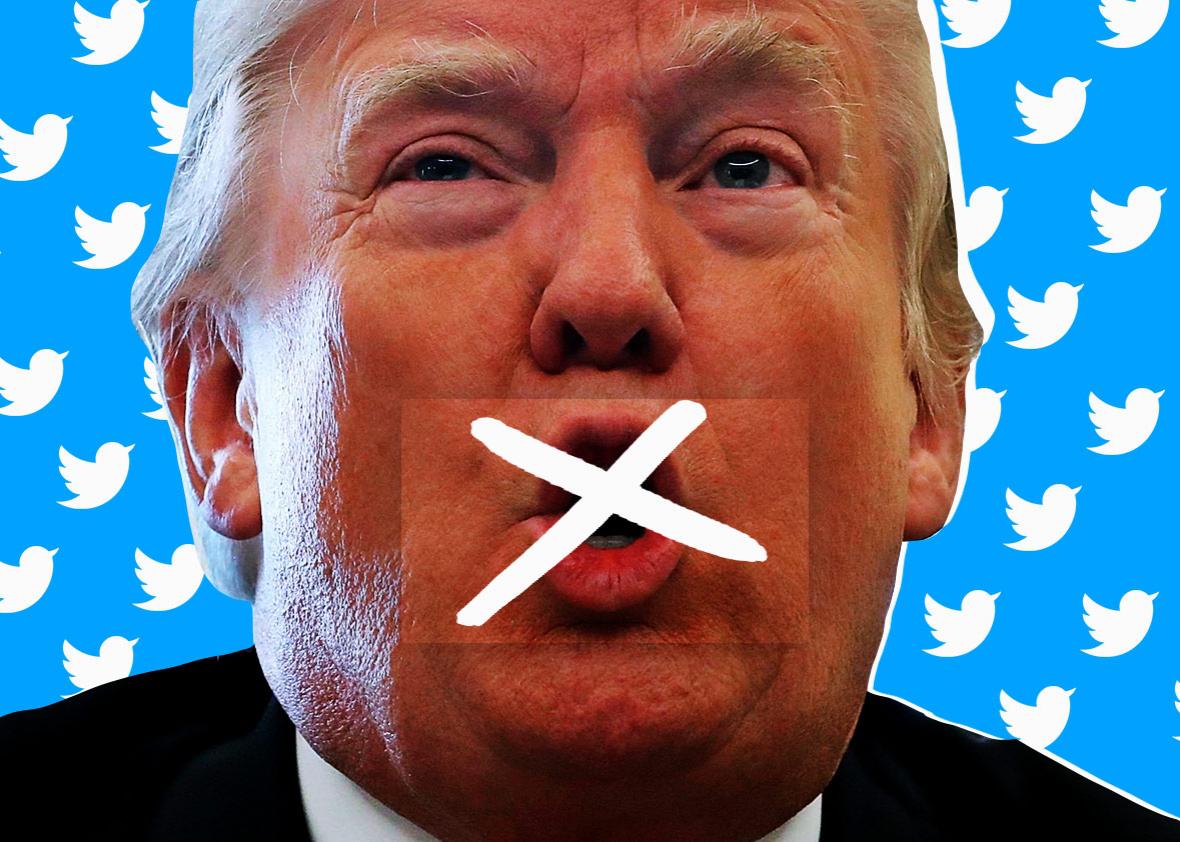Ever since Donald Trump became president, some liberal activists have called for Twitter to suspend his account. His tweets have often violated the company’s policies, they say, by harassing people or threatening acts of violence. Why, they ask, won’t Twitter enforce its own rules?
These calls were renewed Tuesday night, after Trump used Twitter to taunt North Korean leader Kim Jong-un about his nuclear arsenal. Protesters in San Francisco beamed the phrase “@jack is #complicit”—a reference to Twitter CEO Jack Dorsey—onto the walls of the company’s headquarters. In a Facebook post, the activist group Resistance SF wrote:
@jack breaks the rules of his own company, Twitter, to amplify a madman and endanger the world. Jack Dorsey must resign or ban @realDonaldTrump.
The sentiment is understandable. Nobody wants to end up in a nuclear war just because the president has an itchy Twitter finger. But the movement to ban Trump from social media is misguided on multiple levels.
First of all, Trump’s nuclear-button tweet didn’t actually violate Twitter’s policies. Those rules prohibit “specific threats of violence,” which the company defines as “explicit statements of one’s intent to kill or inflict serious physical harm against another person.” Trump’s tweet carried an implied threat of military action—not an explicit statement of intent.
Implied threats of military action, by the way, are a foundation of international relations: It’s called deterrence, and in defter hands than Trump’s it can be an effective peacekeeping strategy. There are good arguments for Twitter to police hate speech, personal harassment, pornography, and other forms of abuse. But the ability to conduct politics, activism, punditry, and even diplomacy via Twitter has long been a core feature of the service. It was never meant to be a conflict-free zone. Which is why Twitter recently clarified that its rules on threats of violence do not apply to military or government entities.
That makes sense. Twitter didn’t give Trump the power to engage in dangerous nuclear brinksmanship, and Twitter can’t take that away from him, either. It was granted to him by the American electorate, and it’s backed by such institutions as the Constitution, Congress, the military, and the judiciary. If you don’t want an egomaniacal man-child to have that power, those are the levers to push on—not Twitter, Facebook, his cellphone company, his hairdresser, or whoever manufactures the microphones in the White House briefing room. No-platforming may have its uses, but it doesn’t work on the president of the United States.
As president, Trump has any number of avenues at his disposal should he want to insult a foreign leader, bash a news organization, or ridicule a celebrity. If he couldn’t poke Kim Jong-un on Twitter, surely he’d find some other way to do so. That’s in contrast to someone like Milo Yiannopoulos, a professional provocateur who found Twitter to be the most effective and conducive platform from which to broadcast his racism and misogyny. (Twitter banned him in 2016.) Drawing the bounds of acceptable speech is always hard, but there’s a clear difference of newsworthiness between the tweets of a U.S. president and those of a fringe right-wing media figure.
You could make a stronger case that certain past Trump tweets violate Twitter rules, and the company has twisted itself in some semantic pretzels trying to explain why they didn’t. But the outcry over this one lays bare that, for many of Trump’s critics, this isn’t really about consistent enforcement of Twitter’s policies. It’s a sort of milquetoast revenge fantasy, a desire to see Trump chastised or muzzled in some way, and calling Jack Dorsey “complicit” is a disingenuous attempt to enlist his company for that purpose.
Finally, while it’s doubtful that taking away Trump’s Twitter would make us much safer, it would almost certainly make Trump himself safer—in his office, that is. Trump may threaten people on Twitter, but the biggest threat that the @realdonaldtrump account now poses is to Trump’s own presidency. Already, his online rants have undermined his policy agenda and alienated potential allies on several occasions, and if you think they’re winning over the public, just look at his approval rating.
Meanwhile, his thoughtless tweets have supplied fodder for the Mueller investigation and in some cases have verged on self-incrimination. Trump has all the power he needs to harass, intimidate, or threaten violence against people without Twitter. But when he does it on Twitter, it’s out in the open in a way that it otherwise wouldn’t be—and it often comes in a rawer, less strategic form. Liberals who want Trump out of office should be rooting for him to tweet more, not less. It might be their best hope to end his nightmare of a presidency ahead of schedule.
